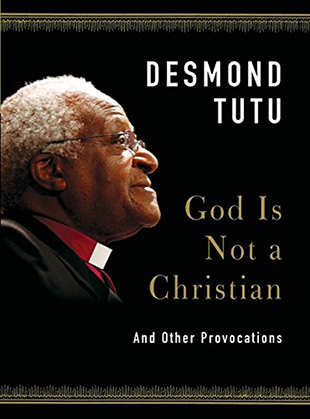"People of religion have no choice in the matter. Where there is injustice and oppression, where people are treated as if they were less than who they are — those created in the image of God — you have no choice but to oppose, and oppose vehemently and oppose with all the force that you have in your being, that injustice and oppression. And so we can't help it if we oppose the obscenity of apartheid, which says that racism is the policy of a particular government. It isn't as if you sit down and say, 'Do I want to, or don't I want to?' If you are a believer you must oppose injustice, whether you are a Muslim, whether you are a Christian, whether you are a Hindu or a Buddhist, because you see, this is one of the common factors in these faiths: not one of them has a low doctrine of human beings.
"Christianity says human beings are created in the image of God; so does Judaism. Islam says you are the abd, the slave, of God whose purpose is to place your will in subjection to the will of Allah. And it says therefore that you are someone who can be in relationship with God. So each of these religions in its intrinsic nature compels its adherents to be people who strive for justice and for peace and for goodness. If you do not, in the face of injustice, stand up and oppose it, then every night you must confess and say, 'God, I have sinned, because I have disobeyed a fundamental law of our relationship.'
"We do our religions scant justice, we put our religions into disrepute, if we do not stand up for the truth, if we do not stand up for justice, if we are not the voice of the voiceless ones, if we are not those who stand up for those who cannot stand up for themselves. It is an incredible thing, that you have this convergence. If you look at how faiths speak of what is the destiny of humankind, we Christians say that the ultimate summum bonum is when we enjoy the divine vision, the beatific vision forever and ever, but we will remain distinct although in relationship with the divine Trinity. Islam also speaks about the time when we will enjoy absolute blessedness in the presence of the divine One. Don't Hinduism and Buddhism, having recognized that we are part of the divine, speak about Tat tvam asi, 'That thou art,' believing that if you can recognize what you truly are — that you are an aspect of the divine and ultimately will return to what you came from — you will be reabsorbed into the divine? All this speaks volumes about what human beings are."
